Cuban exchange teaches more than academics
February 27, 2011 by Jeffrey Yip · Leave a Comment
Alexis Wiessler believes we have a lot to learn from Cuba.
Wiessler, a horticultural student, was one of six students who went to Cuba in October 2010, through an exchange program with the Institute for Sustainable Horticulture, to participate in field research at the University of Sancti Spiritus.
“I just thought going to Cuba and seeing how they do things would be really beneficial to my career further down the road,” she said.
Cuba is a leader in sustainable farming practices, which is using more environmentally friendly techniques to grow crops. Wiessler and some of her colleagues worked on a project using a fungus to fight different plant diseases. They also used plants to attract insects that are natural enemies of other insects that are harmful to crops.
Overall, she believed the research went well, but they did have some problems.
“There were always pigs and goats and turkeys in the fields eating everything,” she said.
For the 26-year-old, the exchange became more than just about sustainable farming. While she knew living in Cuba would be difficult, nothing could have prepared her for just how different things would be. Cramped living quarters and little variety of food were just a couple of the challenges she faced.
It was her brief glimpse into the lives of everyday Cubans that Wiessler will remember most. She said that despite the hardships the Cubans faced every day, they are still a happy, friendly people who appreciate what little they do have.
“It was really refreshing to see people who have so little just not being affected by it that much,” she said.
The biggest challenge for Wiessler was living in a socialist country. She said things we take for granted, such as freedom of speech, don’t happen in Cuba.
“It was kind of scary at times, because we didn’t really know if we were overstepping any bounds,” she said.
As difficult as the exchange was at times, Wiessler doesn’t regret going and encourages other students to go on similar exchanges and keep an open mind about new experiences.
“I always knew we were lucky in North America, but it’s totally a different thing living in another country and really see how lucky we are,” she said. “As hard as it was, I miss it a lot. I started to get really comfortable there.”
Kwantlen’s ISH lab finds a second home in Cuba
September 25, 2010 by Jeffrey Yip · Leave a Comment
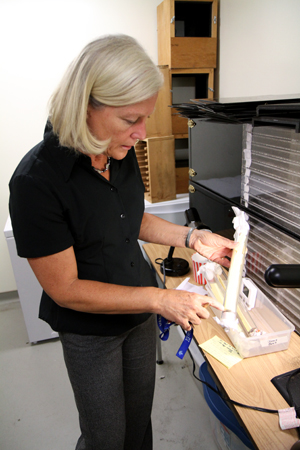
Dr. Deborah Henderson showing how trichogramma sibericum, a tiny parasitic wasp, is produced at the Institute for Sustainable Horticulture's research lab. The wasp is used to help control fireworms, an insect pest that attacks cranberries. (Photo by Jeffrey Yip)
While it still hasn’t put its sign up, the Institute for Sustainable Horticulture lab, or ISH lab, is now up and running.
“I’m glad you came a year after opening … because when it opened we had an empty lab,” Dr. Deborah Henderson said.
Henderson has a PhD in entomology from UBC and a post doctorate in medical entomology from the University of Toronto. Before coming to Kwantlen, she had her own company, ES Crop Consulting Limited, a consulting company in agriculture that provided integrated pest management, monitoring services for farmers, and research and field trials in biological control products.
“It took far longer than I had ever thought to get it up and moving. But, we’re pretty functional now.”
While the ISH lab isn’t a teaching facility, its research project are very much integrated with Kwantlen’s School of Horticulture and the Environmental Protection Technology (EPT) program.
And one of the most important collaborations that the ISH lab has with the two programs is a project in Cuba.
Six students headed for Cuban farms
“There’s a food security project in Cuba and a number of field research trials going on there,” Henderson said. “So, we have six student going to Cuba at the end of October to spend three months working on bio control field trials on a cooperative farm. Two of them are EPT students and four of them are horticulture students.”
Henderson hopes to continue this project over the next three years.
“[W]e want to make it a regular program with Cuba, and integrate it into the new degrees that are in the School of Horticulture. So there could very well be in the future, a course that’s offered in Cuba in the winter term. The students would go down and take that course in Cuba and get credit here,” Henderson said.
According to Henderson, Cuba is the world leader in the use of biological controls, that is using fungi, viruses and other insects to control crop damaging insects.
When the Soviet Union collapsed in the early 1990s Cuba lost nearly 90 per cent of its imports, including food and petroleum products. As the country began to starve, the government enlisted the country’s farmers to find a solution to the food shortages. There answer was to turn much of the available space in the cities into organic vegetable gardens. Because the gardens were in the cities, the food was organically grown, with no chemical pesticides. Instead they used bio controls.
“They’re still using chemicals for some production out in the country,” Henderson said.
“So, the project that we’re working on is the conversion of large cooperative farms to ecological methods. And the students are going to be involved in that. [W]e have a 600-hectare farm that has agreed to convert to these ecological methods.”
Working closer to home
Closer to home, the ISH lab is also conducting research with biological controls. The biological controls the ISH lab works on are a naturally occurring part of the ecosystem. The lab isolates them, makes more of them and tests them to see how effective they are in controlling insects that damage food crops.
But, unlike other labs, Henderson wants their research to go one step further and take successful bio control products all the way to commercialization.
“We’ve got to get products in the hands of growers or else our research isn’t benefiting the people that need the research done,” Henderson said.
A major part of the lab’s work with bio controls has to do with horticultural sustainability. For the ISH lab, achieving sustainability will also focus on how climate change will affect food production, and looking into new production systems that are closer to market will reduce the use of fossil fuels to bring products from far away.
“We are very unsustainable as a species. We have to become sustainable. So any time we can replace unsustainable practices we’re a step towards that goal. And so my particular expertise and experience is doing exactly that,” Henderson said.
“[W]e are going to have to face the reality of climate change. We have a responsibility to take care of our own food security. How can we help anybody else when we can’t feed of ourselves. And right now we don’t feed of ourselves.”
British Columbians ‘want sustainable food production’
According to Henderson, only four per cent of B.C.’s land is arable, that is land that can be used for growing crops. But, Henderson believes British Columbians are sensitive to food security issues and want food production to be sustainable.
“I think we are in great shape. [W]e grow close to 250 crops in B.C. already. So, in that sense we have a pretty big advantage over the Prairies for instance,” Henderson said.
“Quite honestly I think there’s a big social benefit to growing your own food close to home and knowing where your food comes from … and not being so divorced from it that you think it comes from a grocery store.”
As part of being sustainable, the lab itself is doing its part.
“It’s a beautiful facility. It’s been made to be as energy efficient as possible. We’ve applied for LEED certification on it, that’s a designation for environmentally friendly buildings,” Henderson said.
The lab has two sides: microbiology, where they do the research on fungi, and entomology, where they do research with insects and insect viruses. The lab also has production facilities for making fungi and rearing predator and parasitoid insects.
Overall, Henderson seems pleased with the progress the lab has made over the past year, especially in its collaboration with Kwantlen’s horticulture and EPT programs.
“The kind of things we do now with students, I’ve written internships into all of our research proposals,” said Henderson.
“So many of our programs are applied focused … so our research is [also] applied focused. And they enhance each other.”
“We’ve got a little turf project where we’re going to look at compost on turf and so I’m going to communicate with the turf instructors to say, ‘Would you like to get your students involved? Here’s what I have in mind. Do you have any better ideas?’ And we’ll do it with them so that students can be involved.”
Special report: Horticulture studies offer sustainability solutions
December 17, 2009 by Sarah Jackson · 2 Comments
Introduction: The Institue for Sustainable Horticulture
A video interview with Deborah Henderson, director of the Institute for Sustainable Horticulture.
The program: Experiments, hands-on experience drive program, students
At Kwantlen’s School of Horticulture, modern-day environment concerns meet experimentation and hands-on experience.
The school, located at the Langley campus, has assumed a high profile in recent years for its innovation in the field of horticulture.
The Institute for Sustainable Horticulture, a research laboratory which opened in October, received millions of dollars in government funding for its initiative to breed insect, fungus and viral bio-controls that have the potential to replace chemical pesticides as eco-friendly alternatives.
Another project, the construction of a geothermal-heated greenhouse that aims to cut the use of electrical power in Kwantlen greenhouses, is currently in progress. And recently, the school was recognized for installing a “green roof†at the new Salvation Army Gateway of Hope shelter adjoining the campus. The roof will provide food and herbs for the shelter’s kitchen, moderate storm-water runoff and increase building energy efficiency.
Students at the school also regularly participate in experiments testing products such as fertilizers for local companies.
“It’s so important for people to understand what horticulturalists do,†said Michael Cain, a practical horticulture apprentice. “You need plants to grow and be healthy for the Earth as a whole to be sustainable.â€
The four-level apprenticeship program, which runs from November to March during the industry’s off-season, gives students hands-on experience in plant-growth, irrigation, machine maintenance and other field work. The apprenticeship students are all currently working in the industry and returned to school to add education to their experience. The program gives students the option to study production horticulture (which focuses on nurseries), propagation and plant-growth or landscape horticulture (which focuses on turf management, design and machine maintenance), after the first two levels of core courses in science.
The school also offers a degree in integrated pest management; diplomas in greenhouse nursery and production, landscape design and installation, and turf management; and 11 different citations.
Cain, superintendent of Guildford Golf & Country Club, is optimistic about the future for horticulturalists. “Everyone’s going green now,†so knowledge about growing healthy plants is invaluable, he said.
Landscape horticulture received a Red Seal approval in several provinces, including B.C., in 2008. Apprentices now fulfill government testing to receive a Red Seal journeyman ticket upon graduation, which legitimizes the industry as a trade and provides a national license to operate.
“Anyone could call themselves a landscaper at one point… People were doing a lot of damage killing trees and planting stuff in the wrong places,†said the 37-year-old Cain. “Now, what you’ll find when people start getting more qualified, is our landscapes will be more sustainable, grow healthier and bigger and be free of diseases and pests because they’re grown properly and maintained properly.â€
Cain found the School of Horticulture a good fit after 20 years of work in turf management. Two kids, a job and a mortgage limited his educational opportunities, but the timing of Kwantlen’s apprenticeship program allowed him to continue to support his family during his education.
“I love that my office [at Guildford Golf & Country Club] is 150 acres of green space,†he said. “I just want to be a better steward of our environment.â€
Knowledge about plants, pest control, irrigation and machinery could potentially allow horticulturalists to grow plants, shrubs and trees that last for hundreds of years, said Cain.
“You’re never going to be rich… but it’s a really rewarding career choice because you’re surrounded by nature.â€
Horticulture students at work
Green-thumbed students give back through toil and soil
October 8, 2009 by Mitch Thompson · 4 Comments
Taking inspiration from the popular show “Extreme Makeover: Home Edition,” Kwantlen Horticulture students remodeled the yards of a deserving Coquitlam family, the Yules. The students were just one part of the renovations, with a group called the Home Team completely remodeling the inside of the house.
This is the third year that the department has partnered with the Home Team. See the full story in Abby Wiseman’s article, which follows the photos.
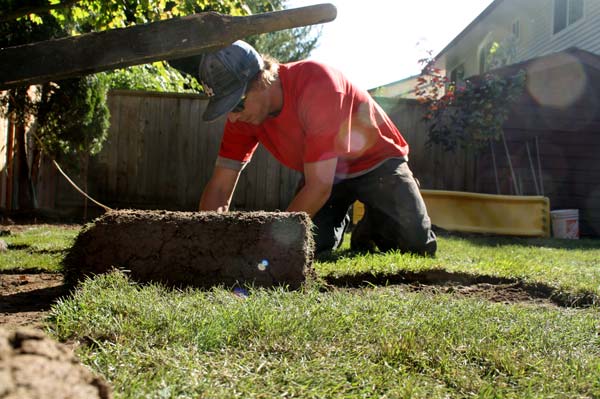
Jared White puts down a piece of sod in the backyard. Sod is a strip of grass and soil used to quickly create lawns. (Mitch Thompson photo)
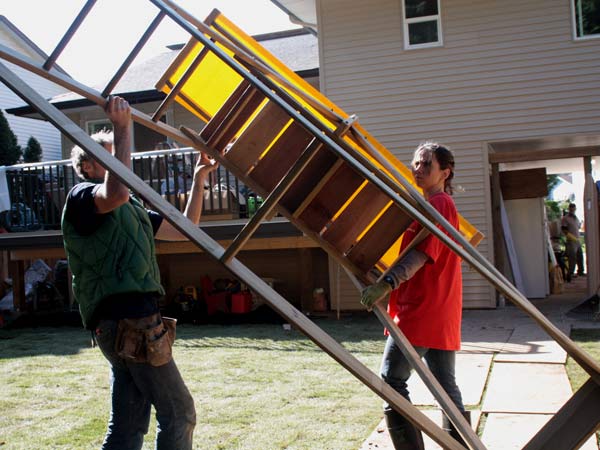
Emily Balzer and Sam Keefer carry in a piece of the new swing set. (Mitch Thompson photo)
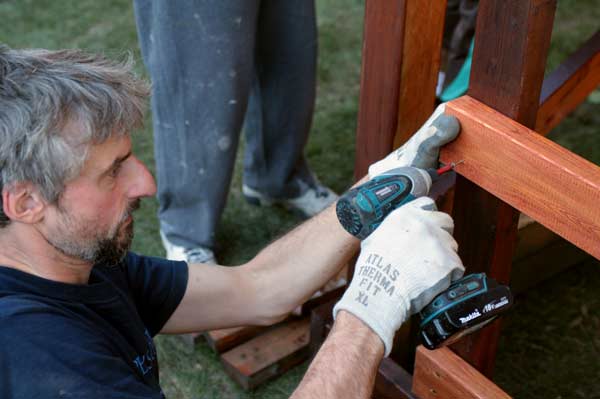
Keefer secures the ladder that will lead up to a new wooden playhouse for the children. The house was donated to the family by the Vancouver Golf Club. (Mitch Thompson photo)
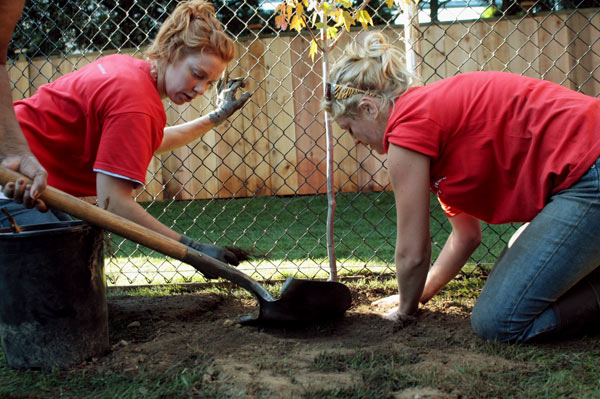
With barely half an hour to go before the reveal, Alyssa Chuback and Kasia Kilner quickly plant one of two new trees for the backyard. (Mitch Thompson photo)
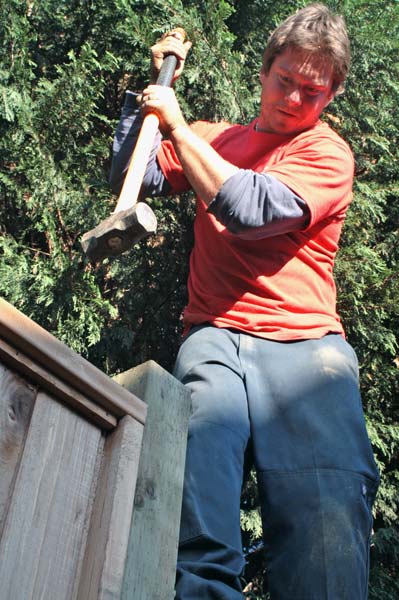
Adam Graham lends a hand to the carpenter by hammering the final section of fence into place. (Mitch Thompson photo)
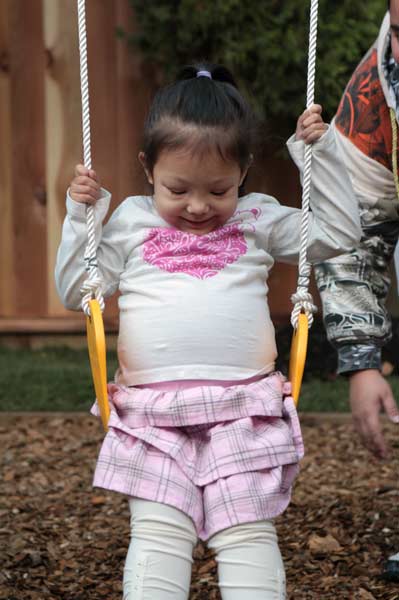
The littlest Yule takes her first ride on her new swing set. The entire family was stunned by the work of the Kwantlen Horticulture students. (Mitch Thompson photo)
By Abby Wiseman
Kwantlen horticulture students got the opportunity to get out of the classroom and put their lessons to practical use last weekend.
While Cornerstone Community Church members were renovating the home of the Yule family in Coquitlam, Kwantlen’s students designed and landscaped the backyard.
This is the third year Kwantlen students have worked with the church and the second time student Alyssa Chuback has been part of the church’s Home Team project.
“Giving back to someone who has given a lot is very rewarding, and it makes you feel good about yourself,†Chuback said.
Stan Kazymerchyk, turfgrass management instructor, feels the project is good for the students, who not only get to put their knowledge to practical use, but also get a rewarding experience, saying the students learn how “to help people, how to be people.â€
The 13 students worked for two days to create a yard for the Yule family. Sunday the renovated house and yard was revealed to the family.
Homeowner Brian Yule was overwhelmed by the changes, saying that he was lost for words.
“Thank you all so much. Beautiful people, beautiful people,†Yule said.
Kazymerchyk hopes to continue getting his students involved in The Home Project for years to come.
“It would be tough to turn down,†Kazymerchyk said.
Each year, the church chooses a family in need and carries out a complete home renovation.
Kwantlen receives $250,000 donation, largest-ever
November 17, 2008 by Nick Major · Leave a Comment

Peter Dhillon announced a quarter-million-dollar donation to Kwantlen's horticulture program Monday. (Nick Major photo)
The Kwantlen School of Horticulture has recieved a $250,000 donation from a prominent Richmond resident, the Kwantlen University Foundation officialy announced today.
Peter Dhillon, president and CEO of the Richberry Group, Canada’s largest cranberry producer, chose to support Kwantlen’s growing horitculture program because of its contributions to the community, and his family’s belief in accessible education.
Dhillon has been a resident of Richmond for the past 30 years. He has served on many local and national boards, including Simon Fraser University’s Board of Governors, the Vancouver International Airport Authority and Ocean Spray Cranberries Inc.
“It’s our belief — me, my family’s, and my business — to support horticulture industries any way we can,” said Dhillon to a small crowd of reporters and photographers at the Richmond campus conference centre Monday. “It’s an industry that’s been very good to my business, my family, my employees and myself.”
In return, Kwantlen will name a research lab the  R&H Dhillon Entomology Suite after Dhillon’s parents, Rashpal and Harbhjan, who invested in cranberry bogs in the late 1970s. Rashpal was also Canada’s first Indo-Canadian police officer.
The identity of the donor was kept anonymous until the 11:30 a.m. announcement, with the advance media invitation only identifying the donor as a prominent Indo-Canadian member of the Richmond agricultural community.
The donation is the largest financial donation in Kwantlen’s 27-year history. Richberry Group had made a similar donation in the past to the University of British Columbia’s Horticulture school.



